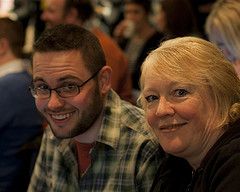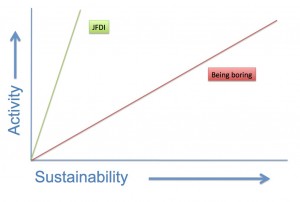
I had an enjoyable time at the Likeminds conference in Exeter yesterday (Friday 26th Feb). Before I start going on about the content of the event, I really ought to praise the organisers for the amazingly smooth way the event ran – it really was superbly run. One great innovation was the lunchtime sessions – focused conversations on a topic facilitated by an expert. I attended Lloyd Davis‘ lunch on cloud culture, which a lot of fun and on which I blogged earlier.
It was a little more marketing focused than the events I usually attend, which provided a different perspective on things – albeit not a perspective I was always terribly comfortable with.
I’ve never worked in communications, or PR, or marketing, or anything like that. I’ve certainly never used the word ‘brand’ in a sensible conversation, as far as I am aware. I’m sure all of this activity and discussion is vital, though, it’s just not one I feel I can really contribute to in a meaningful way.
What was interesting for me was the impression I got that, in some ways, the debate around the use of the internet to increase engagement, and the effect it has on organisations’ working culture, within the public sector might be slightly more mature than in the private sector. I could be wrong, and it could just have been because I was at an event focused on marketing and PR, but an awful lot of the conversation in government about this stuff is focused on issues other than how it affects external comms issues.
Public-i‘s Catherine Howe – who I was delighted to meet in real life for the first time – really summed this up well in her post about the event:
Here it is – I do not want us to miss the enormous opportunity that the social web affords us to make social change by losing it in a miasma of attempts to sell stuff to each other. I do not want to talk about marketing and how brands can influence people – I want to talk about people having more power over the world around them. I don’t want to talk about social communications – I want to talk about fundamental culture change and how we can influence it.
This is a much more articulate way of describing something I mentioned recently:
…while the internet is undoubtedly important for communications, it’s a mistake to put all of this stuff in a box marked comms and assume it doesn’t affect or benefit other parts of the organisation and the way they work.
Organisations of any description have an awful lot more to learn from the culture of the internet than just how to either sell stuff or get people to like the stuff they do. The lessons that the internet teaches us are around the way being more transparent and cooperative in the way we do things is a more effective way of working. I’m repeating myself, I know.
Back to Likeminds. Jonathan Akwue from Digital Public gave one of the best talks, and it was the first one on the day, too. I grabbed it on my trusty Zi8:

 Lloyd Davis is a lovely man, and a very clever one at that. He founded the
Lloyd Davis is a lovely man, and a very clever one at that. He founded the 